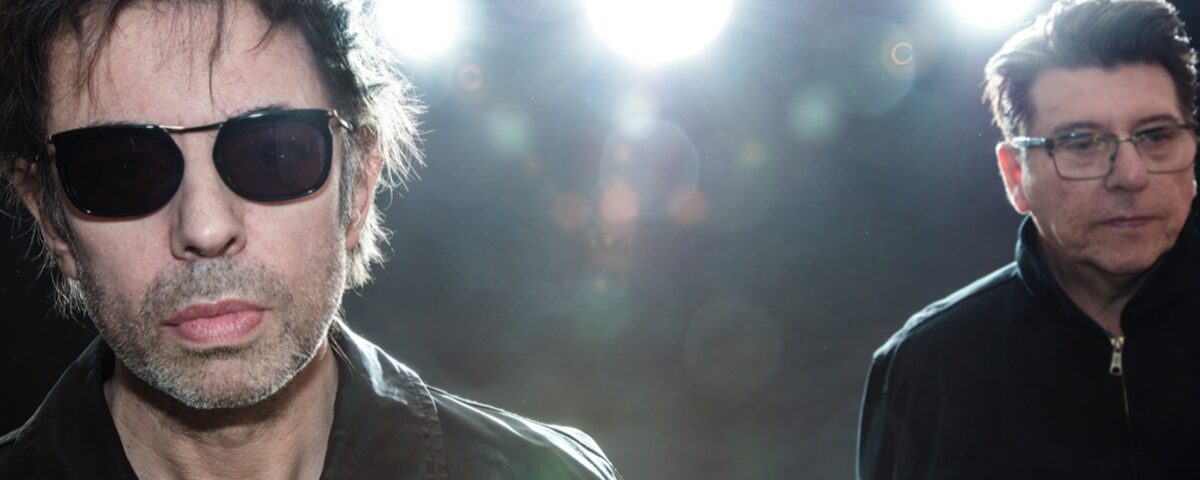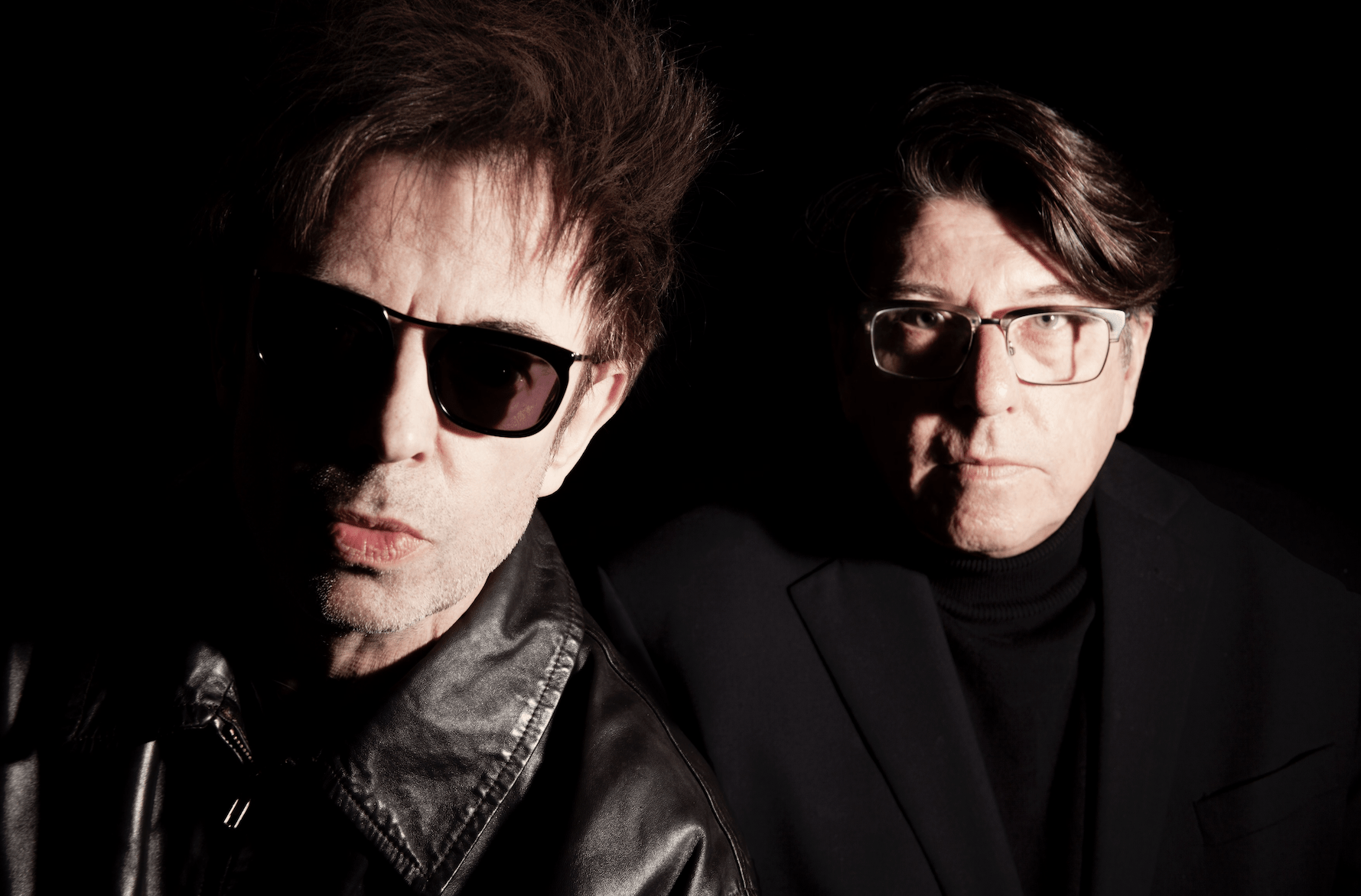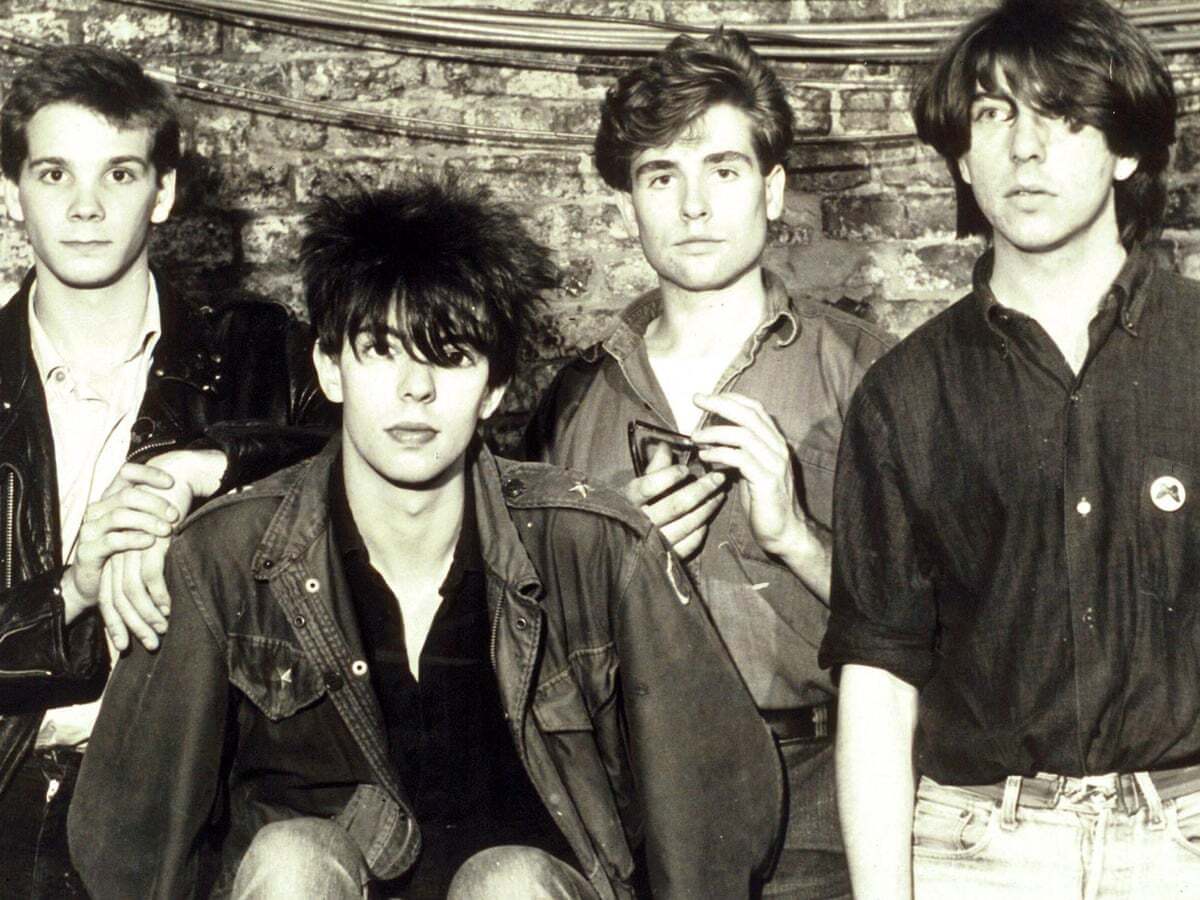
Shadows loom long at the backstage door stretching across the floor of the wooden stage. The crowd roar at the impending rock star entrance: is it them? Silhouetted against the light, Ian McCulloch strides out, tall, black-clad, sun-glasses cool. It could be an arena welcome, for we are in the presence of rock royalty. But this isn’t the O2 London. It’s not LA’s Hollywood Bowl. It’s a small gloomy venue: Paard van Troje, in The Hague, Netherlands. Over the cheer, Will Sergeant’s distinctive ringing guitar-sound heralds an oldie: Going Up (in fact most of the set will comprise songs from the band’s first pre-1987 incarnation, perhaps to satisfy the predominately post-forty crowd).
The band is Echo and the Bunnymen.

Ian McCulloch and Will Sergeant
Contemporaries of U2, REM, the Cure, and the Smiths, the Bunnymen sprang from the burgeoning Northern post-punk era of the early eighties and once stood at the apex of cool, melodic, indie rock. By 1987 they were on the verge of the same international superstardom that the others (largely) went on to achieve.
It would be about ’78, ’79, probably a Thursday night. Joy Division were playing, but nobody was watching them—no one had heard of them then. I watched them from the front. I went back to where everyone was hanging out and said: ‘You’ve got to have a look at these guys, they’re amazing!’. I got really into them, we all did.
Instead, through a series of self-inflicted miscalculations and missteps, they play today to small clubs with a rapidly dwindling audience—In the Margins—as their archetypical 2005 track suggests (from the equally aptly-titled album Siberia).
Ian McCulloch still has the voice; perhaps too American-accented for a Liverpool native, perhaps channelling the spirit of Frank Sinatra, perhaps also the greatest singing voice of his generation. Likewise, Will Sergeant's guitar playing, made up of melodic ringing notes, tremolo-bar twang, undulating riffs, awash in reverb and delay, never overriding or detracting, but adding to the songs. He should be worshiped alongside Johnny Marr, Peter Buck, or the Edge—peers who took the instrument and made it sound like only they could. That he isn't, is in itself an injustice.
I find something alluring about also-rans. About artists who don't quite achieve the enduring commercial success they “deserve.” There's something of the outsider about them. There's something appealing about a group or individual artist carrying on anyway, even though no one is really listening. You do it for yourself. For your art. Your legacy. Because you need to. Because what the hell else would you do?
Vincent Van Gogh, whose work I also got to view for the first time in an expansive context on this trip—at Amsterdam’s Van Gogh museum, has a similar mystique. The Red Vineyard was the only painting Van Gogh ever sold in his lifetime. It takes grit, self-belief, determination and an equal measure of insanity to go on and paint another nine hundred. Similarly, when McCulloch (often) describes their 1984 epic Ocean Rain as “the greatest song ever written” it’s hard to argue with—other than to say, yeah but what about The Killing Moon, Bring On The Dancing Horses, Zephyr, Don't Let It Get You Down, Nothing Ever Lasts Forever, Rust, Stormy Weather, In The Margins, I Think I Need It Too?
A discarded out-of-tune guitar with the slack picked up by a young band on fire
Success is fleeting. Today, everything from music to marijuana is a product to be marketed to the masses by ad agencies in neat packages easily encapsulated in fifteen second TVCs, single line GoogleAds, or two hundred and eighty characters on Twitter. What is cool will not be cool next week. Would Van Gogh would sell to an unknowing public with a catchy headline?
“It’s like Monet, but rougher.”
“Sunflowers look great on anyone’s wall.”
“This artist made selfies, before selfies.”
Great art takes time to appreciate. It requires work and thought. You can’t easily sum it up. Although perhaps Echo and the Bunnymen is the exception.
We write great songs and we’ve written some of the greatest.

Original line-up Pete de Freitas (drums), Ian McCulloch (vocals), Les Pattinson (bass), and Will Sergeant (guitar)
Echo and the Bunnymen imploded in 1987 with the motorcycle death of drummer Pete de Freitas, McCulloch’s inflated ego thinking he didn’t need Sergeant (he did), and Sergeant’s belief that fans would accept the band with a new singer (they didn’t). Sergeant derides 2014's Meteorites album as essentially McCulloch solo in all but name, just as McCulloch hates the 1990 album Reverberation, which Sergeant made without him.
Of the earlier material, Crocodiles, Heaven Up here and Porcupine, have a similar flawed, rough, post-punk feel as U2's pre-Unforgettable Fire triptych: a band learning how to play, write and sing. It all came together for Echo and the Bunnymen in 1984 with their Unforgettable Fire, Ocean Rain.
Both reformed the band, essentially as a duo in 1997 (1994 if you count Electrafixion—the one album McCulloch/Sergeant grunge inspired side project) and quietly spend the next two decades making 5 (or 6) of the best albums of their career (Burned, [as Electrafixion]—1995, Evergreen—1997, What Are You Going to Do with Your Life?—1999, Flowers—2001, Siberia—2005, The Fountain—2009).
Sadly, no one was listening.
No one (new) is listening still.
I'd like to be more involved in the records than I am. I've got loads of songs, virtually finished, just need vocals, but Mac won't listen to them.
Yet even as a 4 cylinder band firing on only 2 (or 1.5) cylinders Echo and the Bunnymen's most recent album Meteorites far eclipses tepid new releases by contemporaries such as Morrissey (I Am Not a Dog on a Chain), Johnny Marr (Call the Comet), New Order (Music Complete), or U2 (Songs of Experience). Imagine a moment what kind of classic music they might be making if McCulloch/Sergeant were still speaking, combining ideas and working closely together?
While Morrissey (with his appealing catalogue of Smiths teen angst) still pulls young fans by the droves to his gigs, Echo and the Bunnymen face an aging audience who remember only their past, not the engaging present-day body of work they are still creating. At Paard van Troje they play only one song from their comeback period. A lack of confidence in the newer (superior) material, or just going through the motions of playing what they think the dwindling crowds want to hear? I hope not.
In his 1956 book The Outsider Colin Wilson that suggested that social rejection may both be the result of a creative personality, as well as that which fuels creativity.
They are the greatest songs ever written (laughs), especially How Far? I love it. When I was singing it, I thought: This is Mick Ronson playing a choppy guitar. I thought I’d written something from Bowie’s Starman period.
Outsiders find inspiration in creating art and succeeding (or not) against the odds. And while the need for belonging may still linger, the need for individuality is stronger. Fuck the in-crowd of “cool” kids who glide through life with ease.
Being an outsider is embracing non-conformity. Doing whatever you want and not caring for commercial considerations, or what people think or desire. Just doing what you want because you need to. Because you are. Echo and the Bunnymen. Forever in the margins. Forever outsiders.
Follow on Facebook
[cardoza_facebook_like_box]




